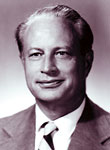Bob Foote, pioneer in livestock in vitro fertilization and reproduction, dies at 86
By George Lowery

Robert H. Foote, a Cornell professor emeritus of animal science whose pioneering research led to in vitro fertilization in agricultural livestock, animal cloning and a discovery that female mammals are born with a finite inventory of eggs, died of lung failure in Ithaca Oct. 27. He was 86.
Foote's research has prominently contributed to modern livestock breeding techniques and an improved understanding of mammalian reproduction, including humans. Most of his work focused on in vitro fertilization, culture and micromanipulation of embryos; oogenesis, superovulation and embryo transfer; extenders for semen and sperm cryopreservation; and spermatogenesis.
Foote was among the earliest researchers to monitor animal testicular function and to harvest sperm to artificially breed agricultural animals. He discovered that treating bull semen with a combination of penicillin, streptomycin and ploymyxin helped wipe out Vibrio fetus, a disease that causes abortions in livestock and which, until then, had cost the cattle industry hundreds of millions of dollars.
He also performed the research that established that all eggs in rabbits are formed as oocytes in the fetal ovary. Today it is well understood, as a result of Foote's research, that a female is born with all the eggs she will ever have, with the store depleted throughout her reproductive life by degeneration and ovulation.
In 1996, when scientists at the Roslin Institute in Edinburgh, Scotland, announced the successful sheep clone Dolly, media outlets sought Foote to understand the impact. Soon after, fearing that labs would pursue human cloning, state legislatures began introducing bills to ban the cloning research. In 1997, Foote warned the New York State Senate against passing such narrow bills, telling them that media hype had contributed to public misunderstanding. The bills never passed.
Foote also received national attention in 1998 when he publicly denounced the plans of Chicago-area scientist Richard Seed to clone humans.
Born on a dairy farm in Gilead, Conn., on Aug. 22, 1922, Foote earned a bachelor's degree from the University of Connecticut, Storrs, (1943); and his master's degree (1947) and doctorate (1950) from Cornell. He joined Cornell as an assistant professor in 1950 and became a professor in 1963.
During World War II, Foote served as a lieutenant in the famed "Go For Broke" 442nd Regimental Combat Team, a unit formed of Japanese-Americans. The 442nd suffered high casualty rates and became among the most decorated units in the war. Foote received a Bronze Star Medal after he was badly injured in 1944.
Foote was predeceased by his first wife, Ruth Parcells. He is survived by two sons and his second wife, Barbara Johnson Foote.
A memorial service will be held at the First Congregational Church, 309 Highland Road, Ithaca, N.Y., Nov. 9 at 3 p.m. In lieu of flowers, memorial donations can be made to the Robert H. Foote Outreach Fund at the First Congregational Church; the Kendal at Ithaca Rainy Day Fund; the Robert H. Foote Fund at Cornell; or the charity of one's choice.
Media Contact
Get Cornell news delivered right to your inbox.
Subscribe